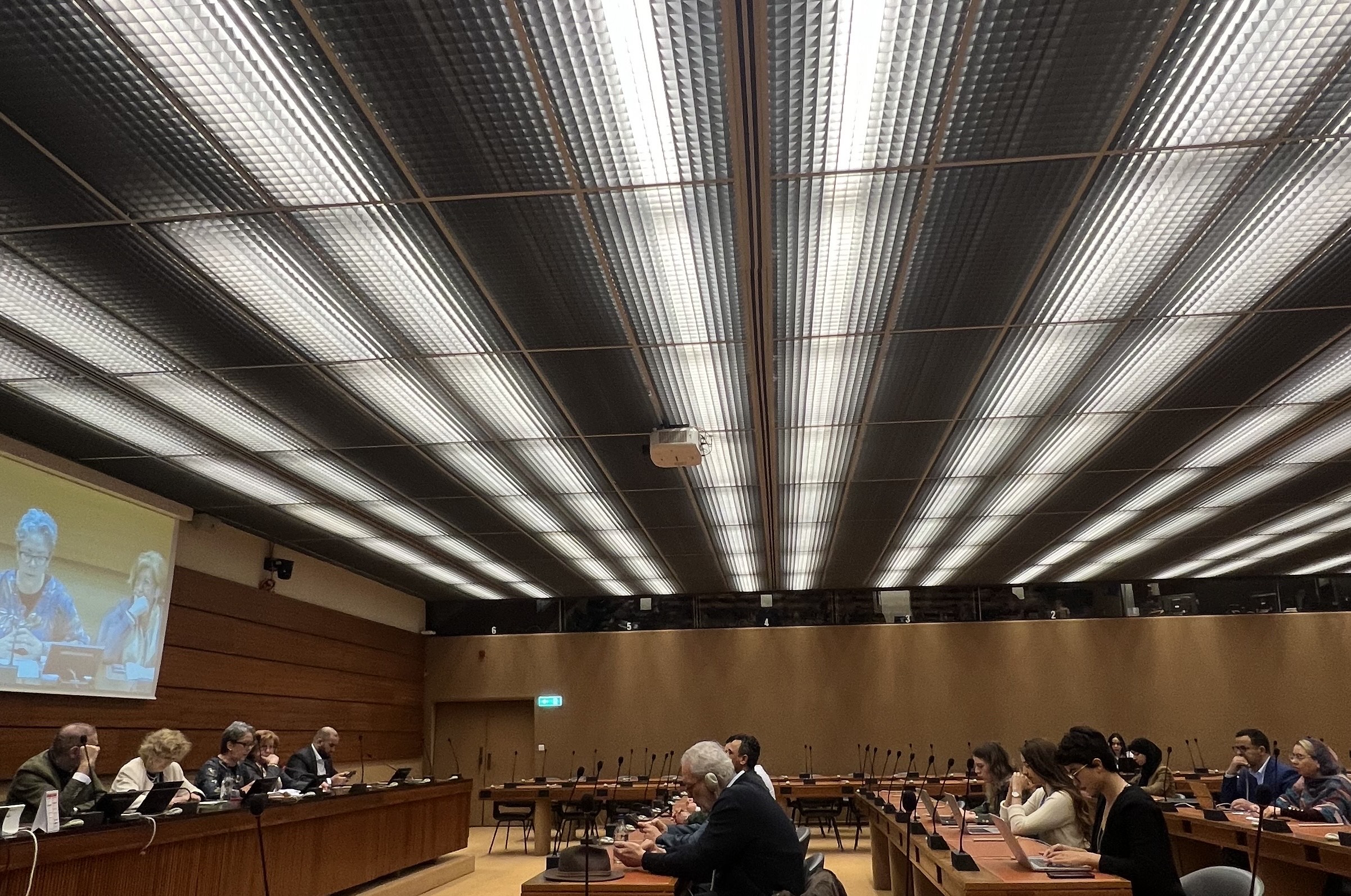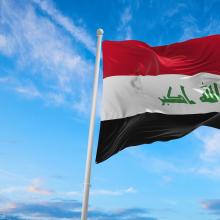April 22, 2025

From left to right: Mouloud Boumghar, Special Rapporteur Mary Lawlor, Monia Ben Jemia, Nassera Dutour and Zakaria Hannache speak on the repression of civic space in Algeria during an event at the UN Human Rights Council in Geneva on 7 March 2025.
The event was co-organized by Article 19, the Cairo Institute for Human Rights Studies, Amnesty International, the International Federation for Human Rights (FIDH), the World Organisation Against Torture (OMCT), and Human Rights Watch. The panel featured human rights experts and representatives of Algeria’s civil society. Speakers included Mary Lawlor, UN Special Rapporteur on the situation of human rights defenders; Zakaria Hannache, a prominent human rights activist; Mouloud Boumghar, professor of public law; and Nassera Dutour, president of the Collective of the Families of the Disappeared in Algeria. The discussion was moderated by Monia Ben Jemia, president of EuroMed Rights.
In her opening remarks, Monia Ben Jemia denounced the increasing repression of fundamental freedoms in Algeria. She highlighted authoritarian tactics employed by the authorities, including control over the judiciary, misuse of counter-terrorism legislation, and restrictions imposed on NGOs. “These silencing strategies are typical of all authoritarian regimes, we know them well,” she said, before giving the floor to the panelists.
A call for Algerian authorities to comply with international standards
The first speaker, Mary Lawlor, emphasised that despite reassurances from Algerian authorities, no tangible improvements have been observed regarding the situation of human rights defenders since her visit. She noted that defenders working on economic rights in cooperation with state institutions are granted some operational space, whereas those addressing sensitive issues such as corruption, environmental protection, migration, cultural rights, or advocating for the Amazigh community face significant restrictions. From a legal standpoint, the Special Rapporteur urged Algerian authorities to align the Penal Code with the Human Rights Council’s 2022 resolution, which calls on States to ensure that counter-terrorism measures comply with international obligations and do not compromise the rights and safety of human rights defenders. In her report, she underscored the use of Article 87 bis of the Criminal Code to target human rights defenders under the pretense of counterterrorism efforts. Such an overly broad and vague article enables the disproportionate arrest and prosecution of activists. Lawlor also raised concerns about the repression of journalists and bloggers who criticise the Algerian government on social media. She concluded by stating her willingness to engage in constructive and good-faith dialogue with the Algerian government, while calling for domestic legislation to be brought into line with international legal instruments.
The alarming instrumentalisation of criminal law provisions to suppress human rights defenders
Before addressing the broader situation of human rights defenders in Algeria, Zakaria Hannache shared his personal experience of judicial harassment and subsequent exile. Sentenced to three years in prison for his work documenting the arrests and prosecutions of human rights defenders, political opponents, journalists, and citizens since the Hirak movement, Hannache denounced the ongoing attacks against civil society. He recalled the arbitrary dissolution of the Algerian League for the Defense of Human Rights (LADDH) in 2022, known as one of the country’s oldest human rights organisations. He also criticised the authorities for creating dozens of government-aligned associations that serve more to promote the state's human rights record than to report violations. Hannache listed several Penal Code provisions that he described as repressive in essence, including articles 87 bis, 95, 96, 99, 100, 144 bis, 146, and 187 bis. He illustrated the impact of these provisions with specific cases, such as environmental defender Tahar Larbi, co-chair of the World Amazigh Congress Kamira Naït Sid and Mounir Gharbi, member of the Collective for the Defense of Prisoners of Conscience.
Violations of freedom of information, freedom of association, and the right to strike
Mouloud Boumghar, professor of public law, provided a legal analysis of the recent legislative developments in Algeria. He described a serious deterioration in fundamental freedoms. He recalled that freedom of the press is guaranteed by the Algerian Constitution, but its scope remains limited by broad clauses restricting rights and freedoms, as well as by references to legislation that determines its implementation. He expressed grave concern over the adoption of the Organic Law on Information in August 2023, along with two additional laws enacted in December 2023 concerning audiovisual activity and print and electronic media. According to Boumghar, "these laws set out numerous red lines for journalism and the right to information in a way that effectively strips freedom of expression and press freedom of their substance." The crackdown on civic space is also evident in the labor sector. In 2023, the Algerian government significantly restricted the right to strike. The law on the prevention and resolution of collective labor disputes and the exercise of the right to strike prohibits strikes based on political or solidarity motives, as well as those initiated by unions deemed unrepresentative. It also introduces a prior authorisation system, including substantive control over union activities. Although the Constitution provides that associations can only be dissolved by judicial decision, Boumghar pointed out the overly broad interpretation of legal provisions. He noted that even basic contact between an Algerian association and a foreign organization is considered “cooperation,” which requires prior government approval. The absence of such approval can lead to the dissolution of the Algerian association. In practice, according to him, Algerian law fails to uphold the right to freedom of association.
Disappearances, repression, and hope: Nassera Dutour gives voice to Algeria’s forgotten
Nassera Dutour, president of the Collective of the Families of the Disappeared in Algeria, emphasised that the necessary conditions for associative activity must begin with the rule of law, an independent judiciary, and respect for fundamental freedoms. Echoing previous panelists, she voiced concern over laws designed to stifle dissent, particularly lawyers and civil society actors involved in the 2019 Hirak movement. Dutour also denounced systemic violations of due process, citing frequent absence of legal counsel during hearings and reports of sexual abuse during arrests. She recalled the case of Mohamed Tadjadit, a young Algerian poet repeatedly prosecuted for participating in peaceful protests during the Hirak movement and for exercising his right to freedom of expression. Drawing on her long-standing advocacy for truth and justice, Dutour linked the current crackdown on civil society with the state’s enduring failure to deliver justice for victims of past atrocities committed during the “Black Decade.” With deep emotion, she spoke of her own son, who disappeared in 1997 at the age of 21 during Algeria’s civil war. Still searching for him, she spoke of the anguish caused by the silence faced by thousands of mothers of the disappeared over the years. Dutour concluded by reaffirming her commitment to the fight for truth and justice for the families of the disappeared, for the freedom of Algerian youth, and for the independence of the judiciary.
The event concluded with a question-and-answer session during which representatives of Tunisian civil society present in the room shared the similarities observed between Algeria and Tunisia and reaffirmed their support for the Algerian people.
To watch the full discussion, click here.






